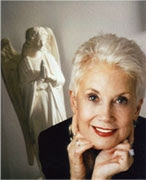Those of us who have been raised Christian have assumed that the only sources of tradition about Jesus and his disciples were the four gospels in the New Testament. Then the surprises began... In 1945 in a place called Nag Hammadi, fifty ancient Christian texts proved the Matthew, Mark, Luke and John are only a small selection of gospels from among the dozens that circulated among early Christian groups. Since then, the Gospel of Judas has been discovered, a gospel I have not yet read. The revealed books have opened up new perspectives on familiar gospel stories. You may have heard the 'newly' discovered gospels referred to as the "Gnostic" gospels.
From my intensive research physically and psychically, the early Christians loved and revered the written records but they were not aware of some of the beliefs that the church included much later on and Christians take for granted. The early Christians received the public teachings and also the private teachings to selected disciples. The private teachings were considered as an advance level teaching for those who understood Jesus' basic message. Even the Gospel of Mark tells the reader that Jesus explained things to certain disciples in private, entrusting to them alone "the mystery of the Kingdom of God." This makes sense.
It was common for rabbis then and many teachers do today to reserve deeper truths for students who are prepared to receive. Gospels like the Gospel of Thomas opens, "These are the secret words which the living Jesus spoke, and Didymus Judas Thomas wrote them down." Well...we all know how people react to the idea of a message being secret. It is the same idea with the ancient teachings and temples being referred to as the Mystery Schools. The energy of mystery also veils the Gospel of Mary Magdalene. The gospel was given to her in a vision. I understand and know that exchanges-teachings can occur through the subtle senses of the spirit.
Irenaes and Bishop Athanasius of Alexandria disapproved of any unusual gospels and rejected them as illegitimate books. It is a shame because in the so called obscure sayings, explanations are more to the point in explaining or supporting interpretations.
Two hundred years after Jesus left the scene, an approved list of gospels were presented in the churches. The approved list consisted of 27 books. The secret books, which contained paradox and mystery very similar to the mystical teachings of Kabbalah were discarded. Historians are debating the secret books and will continue to do so. In my opinion, we know truth intuitively. Discovered treasures from the past tend to explode what was accepted before and students, the faithful, begin to question what is real and what is not real. The early Christian movement was diverse and fascinating. Intrigue creates questions regarding Jesus instigating the events of the passion and seeing them as part of a divine plan to create a higher step on the ladder of consciousness for humankind.
Controversy is good. It forces us to think deeply. The deeper our belief and open mindedness, the greater our understanding of the wise messages offered to humanity. The messages are remarkable because they repeatedly state the truth that everything is already within us. Jesus said in the Gospel of Thomas, "Know what is in front of your face, and what is hidden from you will be disclosed to you. For there is nothing hidden that will not be revealed." This statement includes discernment, intuition, keen observation, belief and deep thinking. We are expected to be bold, knock and trustingly enter.
Friday, April 24, 2009
Subscribe to:
Comments (Atom)
